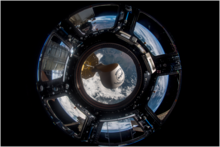| Revision as of 05:32, 12 January 2025 editBoyTheKingCanDance (talk | contribs)Extended confirmed users, Page movers, New page reviewers, Pending changes reviewers175,579 edits Added tags to the page using Page Curation (uncategorised)Tag: PageTriage← Previous edit | Revision as of 05:32, 12 January 2025 edit undoBoyTheKingCanDance (talk | contribs)Extended confirmed users, Page movers, New page reviewers, Pending changes reviewers175,579 editsm Removed the space automatically created as an error by the page curation tool.Next edit → | ||
| Line 1: | Line 1: | ||
| {{AfC submission|t||ts=20250112042450|u=Gspinty1|ns=0|demo=}}<!-- Important, do not remove this line before article has been created. --> | |||
| ] | ] | ||
| The '''Zero Gravity Coffee Cup''' is an invention by astronaut ], notable for being the first patent for an object invented in space, and thereby the first legal invention from off Earth.<ref>https://ntrs.nasa.gov/api/citations/20120006525/downloads/20120006525.pdf</ref> | The '''Zero Gravity Coffee Cup''' is an invention by astronaut ], notable for being the first patent for an object invented in space, and thereby the first legal invention from off Earth.<ref>https://ntrs.nasa.gov/api/citations/20120006525/downloads/20120006525.pdf</ref> | ||
Revision as of 05:32, 12 January 2025

The Zero Gravity Coffee Cup is an invention by astronaut Donald Pettit, notable for being the first patent for an object invented in space, and thereby the first legal invention from off Earth.
The cup is engineered to function in the microgravity environment of space, enabling astronauts to drink liquids more naturally compared to using traditional methods such as squeeze bottles or straws.
History and Development
In the microgravity conditions of space, liquids behave differently than on Earth due to the lack of a strong gravitational force. On Earth, gravity pulls liquids to the bottom of a container, allowing them to be easily sipped or poured. In space, liquids tend to form floating globules, making it challenging to drink using conventional cups.
Don Pettit, an American chemical engineer and NASA astronaut, came up with the idea of the Zero G Coffee Cup during his time aboard the International Space Station (ISS).
He developed a design that utilizes the capillary action—a phenomenon where liquid can flow in narrow spaces without the assistance of external forces like gravity. This channel allows liquid to be drawn up and held against the inner surface of the cup due to surface tension and adhesion forces.
Impact and Legacy
This zero-g cup was featured in the May 2009 issue of National Geographic magazine.
The cup received the first ever patent for an object invented in space.
References
- https://ntrs.nasa.gov/api/citations/20120006525/downloads/20120006525.pdf
- https://svs.gsfc.nasa.gov/11412/
- https://ntrs.nasa.gov/api/citations/20120006504/downloads/20120006504.pdf
- "#WhyIMake | Don Pettit". YouTube. InfoSys Foundation USA. February 6, 2018. Retrieved May 22, 2024.
- https://ntrs.nasa.gov/citations/20120006525
- Charlie White. "Astronaut invents coffee cup for a weightless cup o' joe". Archived from the original on 2011-07-23. Retrieved 2009-08-31.
- "The Zero Gravity Coffee Cup | Science Mission Directorate". Archived from the original on 2018-09-10.
- US 20110101009A1, Donald Roy Pettit, Mark Milton Weislogel, Paul Concus, Roberl Finn, "Beverage cup for use in spacecraft or weightless environments", published 2011-05-05, issued 2011-12-13